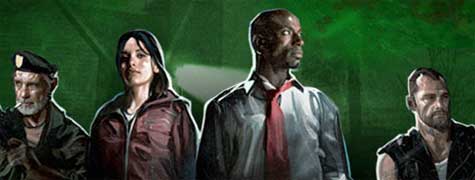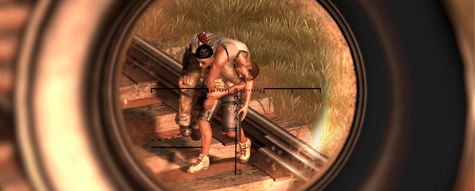
Left 4 Dead is a wonderful game, and there is, to be honest, almost nothing in it I’d change. It’s deceptively simple, lots of fun, and brilliantly executed. But it has a big problem: what happens when the players’ competency doesn’t live up to the drama the AI Director wants to portray.
(Quick digression, for those of you who don’t know: the AI Director is the name Valve has given the enemy AI; it’s a smart move, because the magic of the game really is the AI, and personifying highlights the importance of this game system to the players. It decides what to spawn, when to spawn them, and when to take advantage of players’ sloppiness; as such, it appears cruel and sadistic to most players, and it’s nice that the system has a name you can curse).
My friends and I are reasonably competent and we like a challenge, so we tend to start most levels in Advanced difficulty. Normal is a bit too easy in the early stages, and the apocalypse was never meant to be easy. Anyhow, we make good progress on Advanced for quite a while. The problem tends to come between stages 3 and 5 of any campaign, when we start to get wiped out a lot more.
We all die, and we restart, and we remind each other to stick closer and not shoot each other and not get distracted. And we do a bit better, and then we die. But this is OK; it’s a game, and we want to get better, and we like the challenge.
But after nine restarts, the challenge is wearing thin. And here’s where the problem kicks in: we would like to go to bed soon – it’s a school night, after all – and yet our pride reminds us that we would rather finish the scenario than give up. And so we grudgingly take a vote, drop the difficulty to normal, and thoroughly enjoy the challenge of the always-tough grand finales.
I’m ashamed we dropped the difficultly, but I’d be more ashamed if we didn’t finish the campaign. When this happened for the second time at the weekend, I got thinking as to how you could fix this problem, and I came across one possible solution.
What Left 4 Dead needs is an “arrange mode”.
I would like to be able to tell the game “there are X of us, and we should like to play an exciting zombie-slaying adventure for approximately Y minutes on difficulty Z“.
All the AI has to do is keep pace, supplying the appropriate numbers of highs, a really big finish, but backing off the volume of the zombie horde when it looks like we’re not going to make our time limit. As it stands, a decent run-through on Normal usually takes about 40 minutes, but Advanced sessions are taking me and my regular teammates about 1h45. This way, we could peg the session at, say, 75 minutes, and still have a decent evening’s fun.
If possible, the AI shouldn’t be adjusting the difficulty as it goes along. Players pick a particular difficulty for a reason – challenge, bravado, personal reasons – and you shouldn’t then throw easy-level enemies at them just because they’re running out of time; what Left 4 Dead has already proven is that much of the difficulty can come from pacing (how often the big encounters are, how weak the players are when you jump them) just as well as from hit points.
A good example of a game that already does this it the original PSP Ridge Racer; its “Custom Tour” mode lets you choose how long you wish to play for, and then it assembles a series of tracks that ought to take an average player that length of time; perfect for its handheld platform, as you’re often likely to be playing for known periods of time – a commute – rather than any other knowns. And, you know, I think there’s a lot of other games you can apply this model to successfully too, without any significant impact.
Other than that, though, I don’t want anything changed – and this should be in addition to the current gametypes, not instead of. I’m just a bit tired of admitting defeat and dropping the difficulty so we can get to the finale. Maybe that’s pride talking, but I don’t want to think that Louis, Bill, Francis and Zoey died because I wimped out.

